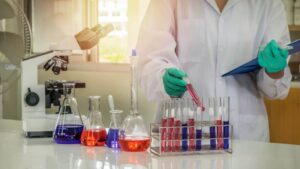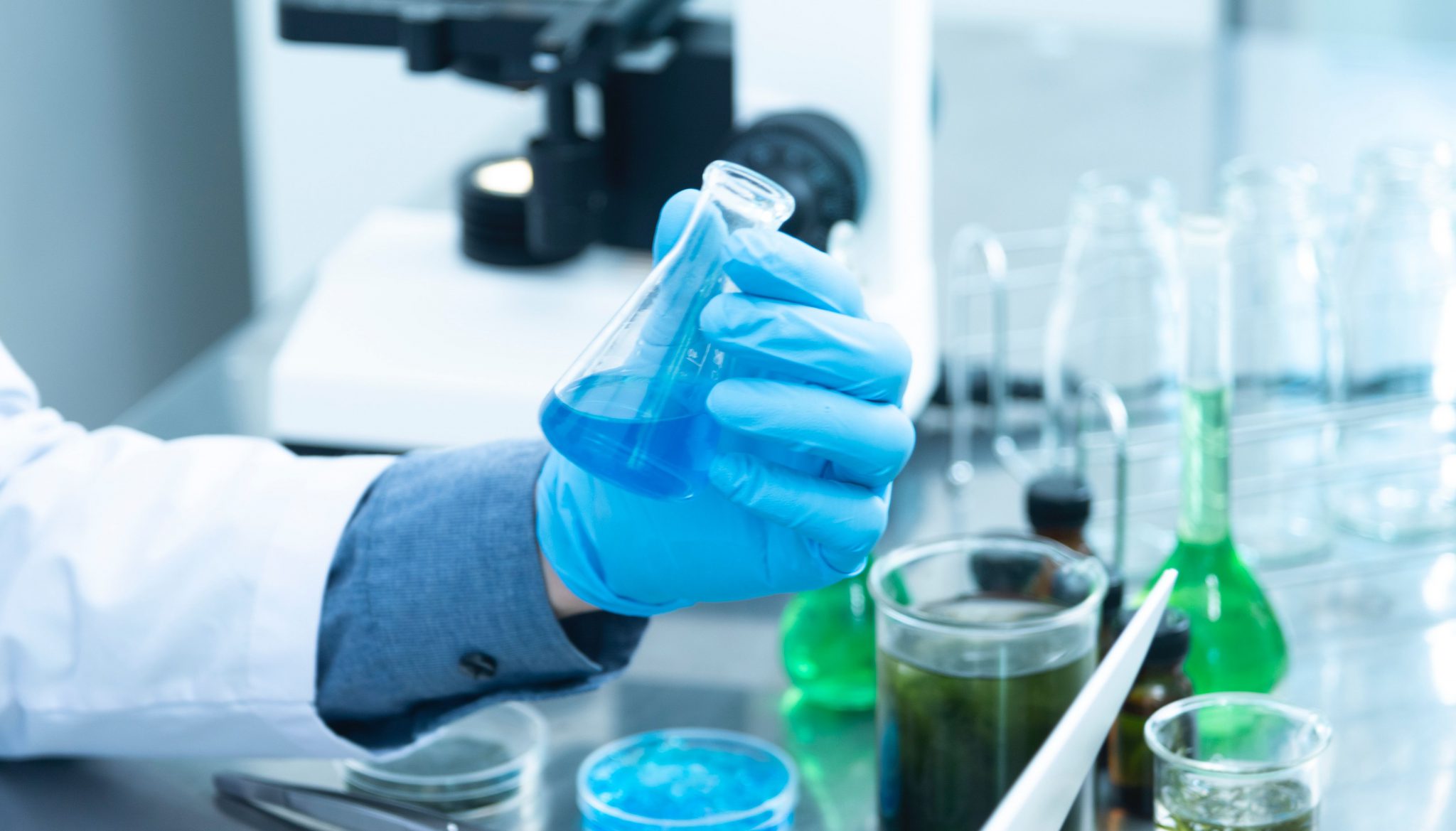Careers In Chemistry: Laboratory and Research Careers (1/2)
In this article, we will discuss Careers in Chemistry. We have provided detail about three: Analytical Chemistry, Environmental Chemistry and Forensic Chemist.
Careers In Chemistry

Analytical Chemist
1. Definition:
An analytical chemist is a scientist who studies the chemical compositions and interactions of different materials. This can include substances like existing man-made chemicals, samples of organic materials and new chemical compounds that scientists develop for various purposes.
2. Daily Work:
An analytical chemist can have many responsibilities that revolve around studying substances to learn about their chemical makeups and behaviors. Some common job duties that an analytical chemist can have are:
- Analyzing samples to determine what materials they’re made of.
- Performing tests on samples using various scientific techniques.
- Preparing materials for tests, such as reagents and solutions.
- Finding ways to use various substances based on their chemical makeup.
- Navigating a laboratory and using specialized equipment and software.
- Keeping detailed records of all tests to ensure they write down all results.
- Conducting research on the different elements that make up a substance.
- Preparing reports that can inform the public and other experts about their research.
- Collaborating with other chemists and scientific experts to support and test each other’s findings.
- Adhering to timelines and deadlines for experiment results.
- Contributing to advancements in the field by working with experts in different areas of expertise and various industries.
- Creating contingency plans in case unforeseen circumstances arise.
- Reviewing the work of fellow chemists to ensure accuracy.
3. Median Salary:
According to the U.S. Bureau of Labor Statistics, the median annual wage for chemists, including analytical chemists, was $79,300 in May 2020.
4. Quote:
“Analytical chemistry is extremely important—probably even more important than analytical chemists think. Everything in science requires measurement; analytical chemists are experts in the science of measurement, not just in determining the structures of molecules and the compositions of mixtures of molecules.” – George M. Whitesides
5. Qualification:
To become an analytical chemist, one typically needs a bachelor’s degree in chemistry or a related field. Some employers may prefer candidates with a master’s degree or a Ph.D., especially for more advanced or research-oriented positions. Additionally, analytical chemists need to have strong skills in:
- Mathematics and statistics.
- Critical thinking and problem-solving.
- Communication and teamwork.
- Attention to detail and accuracy.
- Laboratory safety and ethics.
Environmental Chemist

1. Definition:
An environmental chemist is a chemistry expert who studies the effects of chemicals on the environment and human activities. They analyze the sources, reactions, transport, effects, and fates of chemical species in the air, water, and soil, and how they affect human health and ecosystems. They also develop and test new technologies to prevent or reduce environmental pollution and contamination.
2. Daily Work:
The daily work of an environmental chemist may involve:
- Collecting and testing samples of air, water, soil, or food for pollutants or contaminants.
- Monitoring and regulating the quality of the environment according to environmental standards and regulations.
- Conducting research on new methods or technologies to improve environmental quality or remediate polluted sites.
- Investigating the causes and effects of environmental incidents such as oil spills, industrial accidents, or natural disasters.
- Preparing reports, proposals, or presentations on environmental chemistry topics or findings.
- Communicating with clients, colleagues, or the public about environmental issues or solutions.
3. Median Salary:
The median salary for environmental chemists in the US was $70,500 as of November 2022, according to Comparably. The salary range was from $13,633 to $363,320, depending on education, experience, and location. The average bonus for an environmental chemist was $1,460. Zippia reported a slightly lower median salary of $56,956 as of October 2023.
4. Quote:
“Environmental chemistry is not only a science but also a tool for preserving our planet.” – Mario J. Molina, Nobel laureate in chemistry for his work on ozone depletion.
5. Qualification:
To become an environmental chemist, one typically needs:
- A bachelor’s degree in chemistry, environmental science, or a related field.
- A master’s degree or a PhD in environmental chemistry or a related field for advanced research or teaching positions.
- Knowledge of analytical chemistry techniques and instruments such as chromatography, spectroscopy, or mass spectrometry.
- Knowledge of environmental laws and regulations.
- Skills in data analysis, problem-solving, communication, and teamwork.
6. Top LinkedIn job:
Environmental Chemist – Tetra Tech
Tetra Tech is seeking an Environmental Chemist to join our team in San Diego, CA. The successful candidate will be responsible for providing technical support for various environmental projects involving soil and groundwater remediation, hazardous waste management, site assessment and characterization, and regulatory compliance.
Responsibilities:
- Perform laboratory analysis of environmental samples using various analytical methods and instruments.
- Interpret and evaluate analytical data and quality control results
- Prepare technical reports and documentation of analytical procedures and results.
- Conduct field sampling and testing of soil, groundwater, air, or other media as needed.
- Assist with project planning, budgeting, scheduling, and coordination.
- Communicate with project managers, clients, regulators, and subcontractors
Qualifications:
- Bachelor’s degree in chemistry, environmental science, or a related field.
- Minimum of 2 years of experience in environmental chemistry or a related field.
- Experience with analytical methods such as SW-846, EPA 600 series, ASTM standards, etc.
- Experience with analytical instruments such as GC/MS, IC/MS/MS, ICP-OES, etc.
- Experience with data validation and quality assurance/quality control procedures.
- Knowledge of federal and state environmental regulations such as RCRA, CERCLA, SDWA, etc.
- Proficiency in Microsoft Office applications such as Word, Excel, PowerPoint, etc.
- Ability to work independently and as part of a team.
- Ability to travel to project sites as needed.
Tetra Tech is an equal opportunity employer that values diversity and inclusion. We offer competitive compensation and benefits packages. To apply for this position, please visit our website at www.tetratech.com/careers and search for job ID 23187.
Forensic Scientist

1. Definition:
A forensic scientist is an expert in the application of scientific methods and techniques to matters under investigation by a court of law. Forensic scientists can specialize in various disciplines, such as DNA analysis, fingerprint examination, toxicology, firearms and toolmarks, digital evidence, etc.
2. Daily Work:
The daily work of a forensic scientist depends on their specialization and whether they work in the field or in the laboratory. Some forensic scientists attend crime scenes to collect, preserve, and document physical evidence, such as weapons, fingerprints, bloodstains, etc.
Others perform chemical, biological, or microscopic analyses on the evidence in the crime lab, using various instruments and techniques to identify and compare the evidence. Forensic scientists also consult with other experts, write reports, and testify as expert witnesses in court.
3. Median Salary:
According to the U.S. Bureau of Labor Statistics (BLS), the median annual wage for forensic science technicians was $60,590 in May 2020. The median wage is the wage at which half the workers in an occupation earned more than that amount and half earned less. The lowest 10 percent earned less than $36,630, and the highest 10 percent earned more than $100,910.
4. Quote:
“Forensic science has mutated over the past 50 years into a legal science serving two masters: law enforcement and lawyers.” – Dr. Henry Lee, renowned forensic scientist.
5. Qualification:
The minimum qualification for a forensic scientist is usually a bachelor’s degree in a natural science field, such as biology, chemistry, or physics. However, some employers may prefer candidates with a master’s degree or a doctorate in forensic science or a related discipline.
Additionally, forensic scientists need to have analytical skills, attention to detail, problem-solving skills, communication skills, and the ability to work under pressure and handle emotional situations. Some forensic scientists may also need to obtain certification from a professional organization, such as the American Board of Criminalistics (ABC).
6. Top LinkedIn job:
Forensic Scientist – DNA Analyst
Virginia Department of Forensic Science
Richmond, VA
The Virginia Department of Forensic Science is seeking a qualified applicant to perform casework analysis on biological samples for the presence of human DNA; interpret data; prepare reports; testify as an expert witness; provide training; maintain laboratory equipment; and perform related tasks as needed at the Central Laboratory in Richmond.
Requirements:
- Bachelor’s degree or higher from an accredited college or university with a major in biology (or related field) that includes coursework covering molecular biology (or genetics), biochemistry (or organic chemistry), statistics (or population genetics), and laboratory methods (or molecular biology techniques).
- Experience performing DNA analysis using PCR-based methods.
- Experience interpreting DNA data using software such as GeneMapper ID-X or STRmix.
- Experience testifying as an expert witness in court.
- Ability to communicate effectively both orally and in writing.
- Ability to work independently and as part of a team.
- Ability to follow established protocols and procedures.
- Ability to handle sensitive and confidential information.
- Ability to work with hazardous materials and biological specimens.
- Ability to pass a background check and a drug test.
Apply here: https://www.linkedin.com/jobs/view/forensic-scientist-dna-analyst-at-virginia-department-of-forensic-science-2874019129/
That concludes our article on Careers In Chemistry.
“Be a physical chemist, an organic chemist, an analytical chemist, if you will; but above all be a Chemist.” – Ira Remsen
Continue Reading: 4 Best Jobs In USA From LinkedIn – Linkedin Job Search USA 2024

